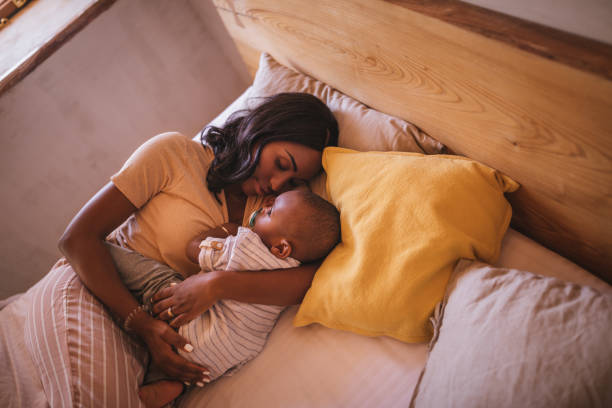
Sleep training involves getting your baby/child into the habit of falling asleep independently without any kind of outside help/assistance. This process varies for every child, even among siblings. When most moms hear about sleep training, they first think of the cry-it-out method. You can use several ways to achieve independent sleep in your child. Despite popular opinion, there is no perfect sleep training method. The ideal approach is the one that works for your family.
Unfortunately, moms feel a lot of guilt around sleep training. There is the tendency to feel overwhelmed about having your baby cry to achieve sleep. I would be the first to say there is no sleep training that doesn't involve some crying, even if minimal. Most babies will.
One of the main reasons moms have challenges with sleep training is the guilt they have come to associate with the process. As a result, you may have already concluded that sleep training is not for your family.
Sometimes, the guilt may come from:
1. Feeling too exhausted to go through the process and be consistent
Even with the best intentions, you may be too tired to consistently follow through with sleep training. You may decide to put it off for the next night, week, or month. While it is reasonable to delay sleep training, for example, if you are going through a period of transition ( illness or move), it is better to pick a time and start, even though you realize it won’t be perfect.
2. Not being on the same page with your spouse or co-parent
There is often a benefit to having varying philosophies when it comes to parenting. With sleep, training is helpful to be on the same page as your spouse or other caregivers. You want to avoid sending mixed messages to your child about what to expect at bedtime. The Baby Center 3-stage sleep solution, recommends that all adults involved in the child’s care should watch the course. This consistent approach will make the sleep training process much more manageable.
3. Potentially thinking you are scarring your baby emotionally
I get it; it is hard to watch your child crying at bedtime. Many parents feel they are potentially scarring their children emotionally. However, based on the research done in this area, there has been no evidence of negative psychological impacts in children who are sleep trained. While no sleep training method is completely free of tears (even the “gentle” methods), you can decide on a method that works best for you and your child’s temperament.
How to ditch the guilt around sleep training
Suppose you are on any social media platform or online for five minutes; you would have seen many varying opinions about sleep training. This may introduce guilt about your decision to sleep train your child or make you question your parenting.
Realize that wanting your child to fall asleep independently is a great goal for you and your child. Whether you decide to sleep train or not, you are a great parent.
While this may not be a popular opinion, setting limits for our children is part of what we do as parents. Children have to learn everything, and sleeping independently is one of those items. The same way you would not intend to carry your baby in a carrier or a stroller all their lives is the same approach we should adopt for their sleep. Likewise, when your child is learning to walk, they may stumble and fall a few times, but that doesn’t mean you go straight to their rescue (except they are in danger) and stop them from learning how to walk.
Here are a few suggestions to deal with the mom guilt around sleep training:
-
See independent sleep as a life skill they need to learn: Helping your child sleep independently sets them up for sleep success in the long run. Healthy sleep habits help your child emotionally, physically, and developmentally.
-
Realize it doesn’t have to be perfect: Most sleep training methods will take anywhere from a few days to a few weeks.You can pick a plan that works for you, depending on your tolerance level. If you realize down the line that the method is overwhelming for you, feel free to switch to a different method
-
Be ready to make adjustments: Many women work outside the home and want to spend more time with their kids. They may worry that putting their kids to bed shortly after getting home will decrease the one-on-one time with them. This is a genuine concern. Remind yourself of the consequences of sleep deprivation on your child’s growth and development. When they sleep well, they enjoy the time spent with you. You may need to move things around and make adjustments, such as spending quality time with them in the morning before heading off to work.
-
Stay consistent: Sleep training can take a few days to a few weeks. No matter what method you choose to sleep train your little one, make your approach and response as consistent as possible. If your response varies, this creates confusion for your child, who doesn’t know what to expect, which may prolong the whole process. It is ok to switch methods if one isn’t working for you, but the key is trying to stick with it as much as possible. Staying as consistent as possible helps leave out the emotions in the process and makes it easier to follow through.
-
Find an outlet: You want what’s best for your child. You want them to be healthy, happy, and successful. A baby that cries during sleep training is protesting this change. Suppose they feel “rescued” each time they experience discomfort. In that case, they miss out on the growth they would have experienced through that discomfort. It’s important not to project your feelings unto your baby when he is crying. Instead, find ways to help you cope; take a bath, take a walk, listen to calming music, and ask for help.
When sleep training, realize your child doesn’t hate you and that you’re not abandoning him. He needs your help to help him learn to fall asleep independently. He needs restful sleep, and so do you.
Are you ready to make sleep a priority, but need help figuring it out? Click here to schedule a one-on-one coaching session with Dr. Brown.
 Dr. Funke Afolabi-Brown, MD is a speaker, an educator, a writer, and the founder of Restful Sleep MD where she helps busy professional women and their children prioritize sleep to not only achieve their optimal health but also thrive and live to their fullest potential. She does this through courses and programs focused on educating and empowering busy professional women to make sleep a priority as a critical pillar of their health.
Dr. Funke Afolabi-Brown, MD is a speaker, an educator, a writer, and the founder of Restful Sleep MD where she helps busy professional women and their children prioritize sleep to not only achieve their optimal health but also thrive and live to their fullest potential. She does this through courses and programs focused on educating and empowering busy professional women to make sleep a priority as a critical pillar of their health.









